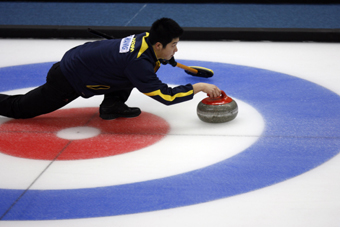Asians in the house as curling takes off in Changchun
(Reuters)Updated: 2007-01-31 09:12
It might seem an unlikely scenario but there are some at the Asian Winter Games this week who think the continent could soon be providing medal winners at major international curling tournaments.
"I wouldn't be at all surprised if in the next two or three year we saw an Asian team on the podium at a world event," said Leslie Ingram-Brown, head umpire at the Changchun Municipal Skating Rink this week.
"The standard of play is very high overall. They're all pushing hard and the Chinese women are in the top 12 in the world. It just needs that wee bit of luck and that wee bit more consistency."
The Scottish publisher, who cheerfully admits to being nicknamed "Stone-mad" because of his obsession with a sport he has been involved in for 45 years, was officiating as the Chinese women had a bad morning on the ice on Tuesday, losing 9-4 to South Korea.
China's men, ranked 23rd, were involved in a dramatic battle with the Koreans resolved only by the last throw of the game when China skip, or captain, Wang Binjiang guided his stone onto the house, or target, to secure a 6-4 victory for the hosts.
Randy Perry, a Canadian who has been coaching the Chinese men for the last year, believes his young team -- they are all in their early 20s -- have the ability to make a real impression in the international circuit in the next few years.
"The Canadians are saying, 'The Chinese are here and they're not going away,'" the ruddy-faced 50 year old told reporters in the distinctive twang of his Newfoundland birthplace.
"Canada used to own it then Europe came along to challenge and after the Salt Lake City Olympics in 2002, the Americans started it up. The Russian women won the European championship recently, a few years ago that would have been unthinkable."
Canada is still the powerhouse of curling, with more than 1,000 dedicated rinks and amateur teams capable of winning up to US$200,000 a year in prize money, and Perry is most impressed with the ranking points both Chinese men and women have won on the highly competitive Canadian tour.
"We train in Vancouver but travel all across Canada, we're based over there because that's where the best competition is," he said.
Vancouver is the host city of the 2010 Winter Olympics and the inclusion of curling in the Games since the Nagano in 1998 has been the main reason behind the huge growth of the sport.
"There is no doubt that getting into the Olympics has boosted the sport tremendously," said Ingram-Brown, while Perry said simply: "The Olympics is everything these days."
|
||
|
||
|
|

